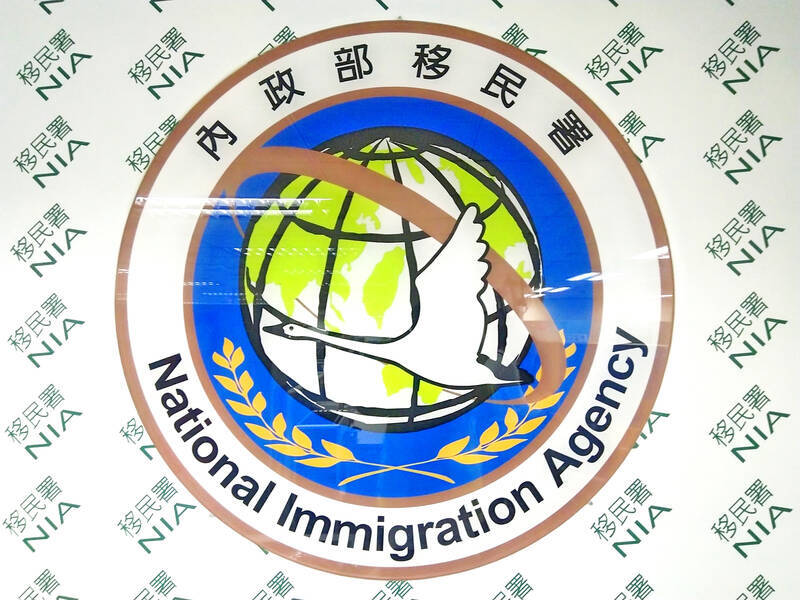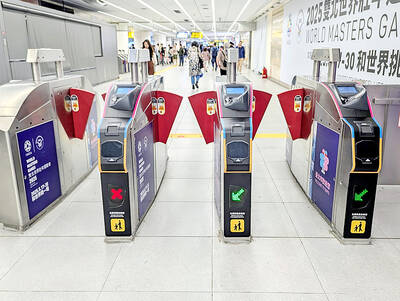The National Immigration Agency (NIA) on Thursday said it had caught 124 people attempting to use forged documents to visit Taiwan since in September last year allowing Chinese nationals based overseas to apply for entry permits.
The NIA’s revelation comes after unnamed immigration officials and travel agency workers on Wednesday said that Chinese entry permit applicants had submitted forged documents showing they were students in Malaysia.
After closing its borders to Chinese tourists on Jan. 22, 2020, amid the COVID-19 pandemic, Taiwan began allowing those living or studying outside of China to enter from a third country on Sept. 1 last year.

Photo copied by Liu Ching-ho, Taipei Times
In a news release, the NIA said that its officials stationed abroad had beefed up screening and inspection processes for Chinese entry permit applicants since restrictions were eased.
NIA customs officials in Taiwan have also conducted in-depth interviews with all Chinese arrivals from third countries, the agency added.
In addition, the NIA said it has been working with prosecutors and police to crack down on criminal groups helping Chinese and foreign nationals enter Taiwan using forged documents.
Under the Regulations Governing the Approval of People of the Mainland Area Visiting Taiwan for Purposes of Tourism (大陸地區人民來台從事觀光活動許可辦法), Chinese nationals caught using forged documents to enter Taiwan could be banned from applying for an entry permit for a maximum of five years, the NIA said.
Authorities would implement measures to prevent such cases, particularly as some individuals applying with falsified documents might have “ulterior motives” for visiting Taiwan, Mainland Affairs Council Deputy Minister and spokesman Liang Wen-chieh (梁文傑) said.
About 134,000 Chinese nationals living or studying in a third country applied for tourism entry permits between Jan. 1 and Nov. 30 this year, 98,000 of whom visited Taiwan, Liang said.

A magnitude 6.4 earthquake struck off the coast of Hualien County in eastern Taiwan at 7pm yesterday, the Central Weather Administration (CWA) said. The epicenter of the temblor was at sea, about 69.9km south of Hualien County Hall, at a depth of 30.9km, it said. There were no immediate reports of damage resulting from the quake. The earthquake’s intensity, which gauges the actual effect of a temblor, was highest in Taitung County’s Changbin Township (長濱), where it measured 5 on Taiwan’s seven-tier intensity scale. The quake also measured an intensity of 4 in Hualien, Nantou, Chiayi, Yunlin, Changhua and Miaoli counties, as well as

Credit departments of farmers’ and fishers’ associations blocked a total of more than NT$180 million (US$6.01 million) from being lost to scams last year, National Police Agency (NPA) data showed. The Agricultural Finance Agency (AFA) said last week that staff of farmers’ and fishers’ associations’ credit departments are required to implement fraud prevention measures when they serve clients at the counter. They would ask clients about personal financial management activities whenever they suspect there might be a fraud situation, and would immediately report the incident to local authorities, which would send police officers to the site to help, it said. NPA data showed

ENERGY RESILIENCE: Although Alaska is open for investments, Taiwan is sourcing its gas from the Middle East, and the sea routes carry risks, Ho Cheng-hui said US government officials’ high-profile reception of a Taiwanese representative at the Alaska Sustainable Energy Conference indicated the emergence of an Indo-Pacific energy resilience alliance, an academic said. Presidential Office Secretary-General Pan Men-an (潘孟安) attended the conference in Alaska on Thursday last week at the invitation of the US government. Pan visited oil and gas facilities with senior US officials, including US Secretary of the Interior Doug Burgum, US Secretary of Energy Chris Wright, Alaska Governor Mike Dunleavy and US Senator Daniel Sullivan. Pan attending the conference on behalf of President William Lai (賴清德) shows a significant elevation in diplomatic representation,

The Taipei MRT is to begin accepting mobile payment services in the fall, Taipei Rapid Transit Corp said on Saturday. When the company finishes the installation of new payment units at ticketing gates in October, MRT passengers can use credit cards, Apple Pay, Google Pay and Samsung Pay, the operator said. In addition, the MRT would also provide QR payment codes — which would be compatible with Line Pay, Jkopay, iPass Money, PXPay Plus, EasyWallet, iCash Pay, Taiwan Pay and Taishin Pay — to access the railway system. Currently, passengers can access the Taipei MRT by buying a single-journey token or using EasyCard,